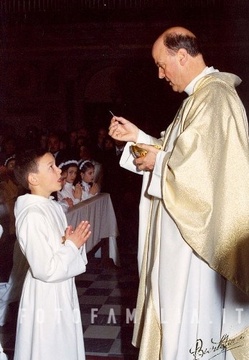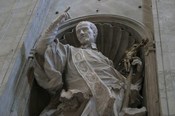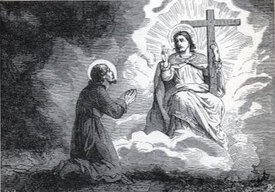Spiritual Life: November 2009 Archives

The Catholic News Agency ran this brief article yesterday (11/19/2009). It captured my mind and heart, like it did for others, because I know two people with Lou Gehrig's disease (and one is also a priest) and another priest who's living with MS. The courage, love and patience these men have witnessed is incredible. At least I think so.
Father Luigi Squarcia, a pastor in the Italian town of Acquapendente who has suffered from Lou Gehrig's disease for the last four years, met with Pope Benedict XVI on Wednesday and offered his "sufferings for the good of the Church."
After the meeting with the Holy Father in Paul VI Hall, Father Squarcia said, "I came to offer the Pope my sufferings for the good of the Church. I am here, for the first time, after years of working with the parishioners and the children at our school."
Now, he told L'Osservatore Romano, "I can no longer move my arms or legs and I know I will lose my speech and later maybe the ability to breathe." He noted that more people than ever are coming to him for the Sacrament of Reconciliation.
Lou Gehrig's disease is a serious neuromuscular disorder that causes muscle weakness, disability and eventually death.
*Father Luigi in a 2004 photo.
If you want a keener sense of what Father Luigi is speaking of when he says I am came offer my sufferings for the Church, then I would suggest you read Pope John Paul II's 1984 encyclical, Salvifici Doloris, where he deals with notions of suffering and how it can be redemptive. That is, how suffering can be useful for the salvation of the work if we unite our suffering to that of Christ's. Putting suffering to good use otherwise it will eat you alive and deaden you affectively and spiritually. If not redemptive then it's all-consuming and verging on nihilistic.
 O glorious Saint Vincent
de Paul, the mention of your name suggests a litany of your virtues: humility,
zeal, mercy, and self-sacrifice. It also recalls your many foundations:
Works of Charity, Congregations, and Societies.
O glorious Saint Vincent
de Paul, the mention of your name suggests a litany of your virtues: humility,
zeal, mercy, and self-sacrifice. It also recalls your many foundations:
Works of Charity, Congregations, and Societies.

